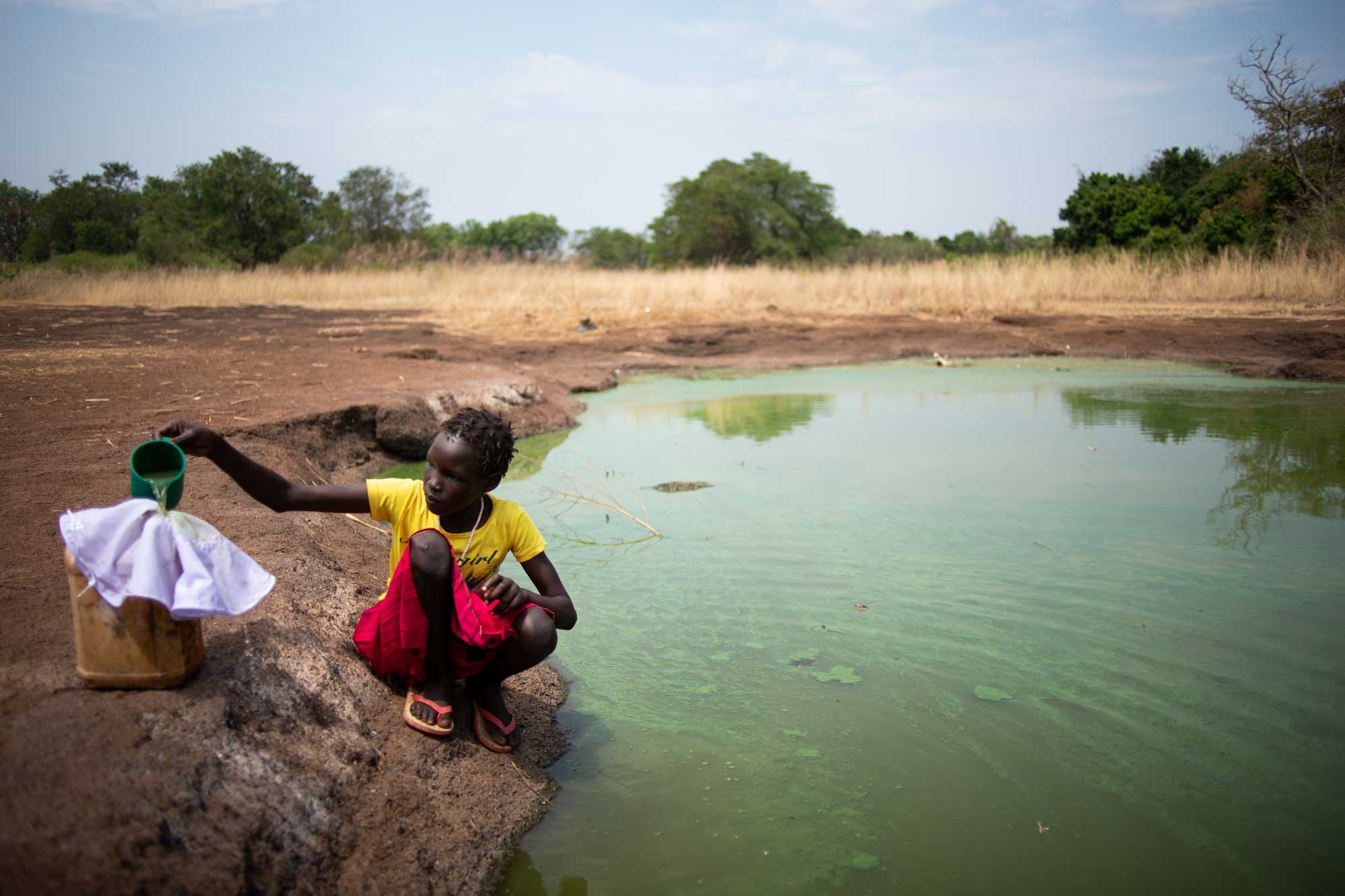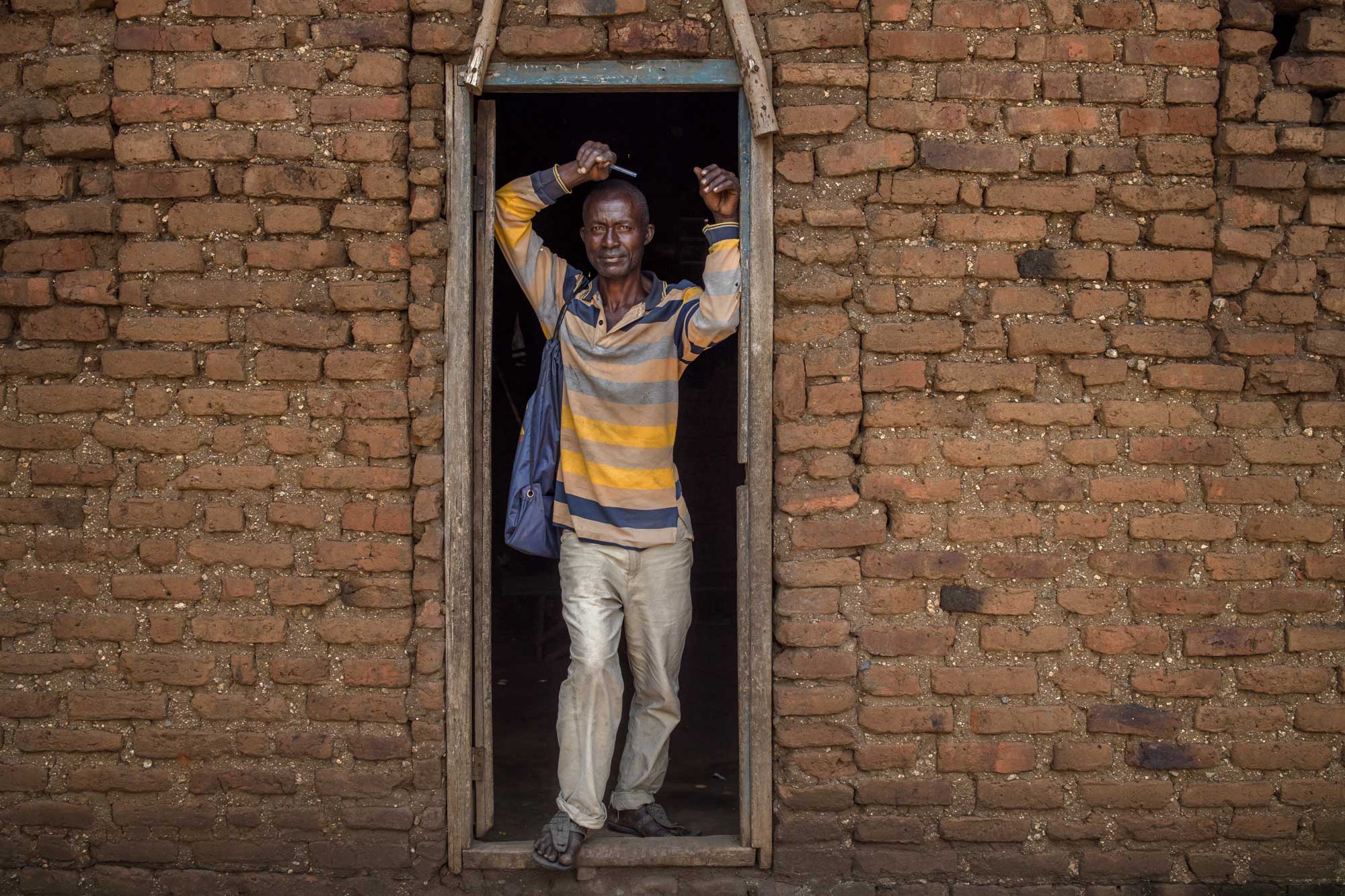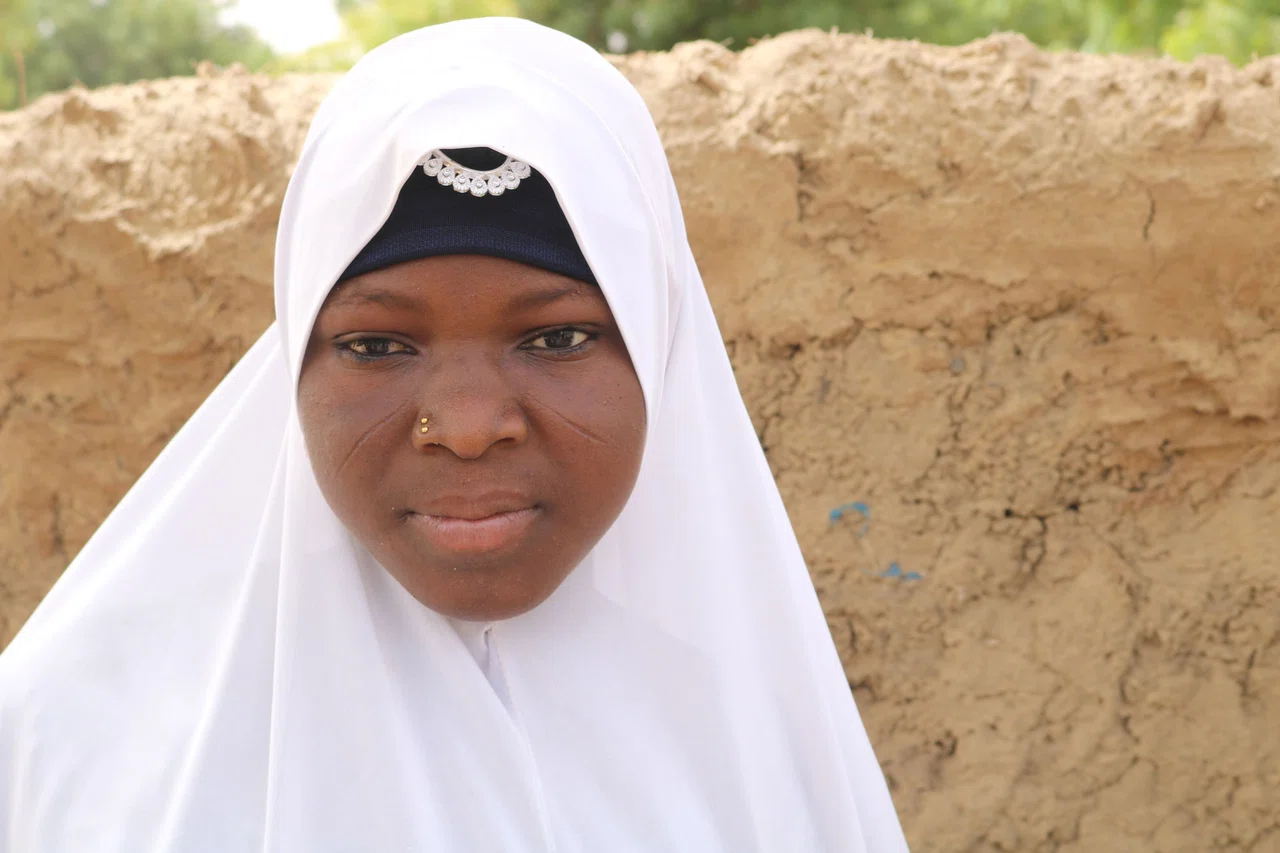

Health Programs
Village chief Fabien Oguama with his wife, Pascaline, and their sons and daughter live in Enugu state, Nigeria. The Carter Center is working to control or eliminate several neglected tropical diseases in the country.
OVERVIEW
STORY
Ethiopia Closes In
STORY
River Blindness’ Foe: Uganda
STORY
From Despair to Hope in the Blink of an Eye
STORY
Journalist Reframes Stories on Schizophrenia
Guinea Worm
Eradication Program
Guinea Worm
Eradication Program
The march toward eradication of Guinea worm disease advanced in 2024 as just 15 human cases were reported worldwide, holding almost steady when compared to the 14 cases reported in 2023. Cases once were counted in the millions. Nine of the 15 human cases reported in 2024 occurred in Chad; the other six were in South Sudan. No human cases were reported in Angola, Cameroon, Ethiopia, or Mali. In these six African countries, reported infections in animals declined 25%, from 887 in 2023 to 664 in 2024. Chad reduced animal infections by 43% — from 496 to 281 — its fifth consecutive year of improvement.
Lymphatic Filariasis Elimination Program
Lymphatic Filariasis Elimination Program
The Carter Center works to eliminate transmission of lymphatic filariasis, a disease that causes swelling of the limbs and genitals and, in severe cases, causes elephantiasis. Transmission can be interrupted with annual treatments in at-risk communities of Mectizan® plus albendazole (donated by Merck & Co, Inc., and GSK, respectively). In 2024, The Carter Center assisted with the distribution of 2.5 million treatments for lymphatic filariasis in three countries. Thanks to years of effective communitywide treatments, 28 million people no longer need treatment. The Center also continued a pilot program to integrate mental health services with its lymphatic filariasis work in Ebonyi state, Nigeria, where baseline assessments revealed high rates of depressive symptoms in persons with lymphatic filariasis. The program, in collaboration with the Center’s Mental Health Program, enhanced training of health personnel to provide mental health services for individuals suffering from chronic disease.

In 2020, an 11-year-old girl strains pond water through a household filter near her home in Gog, Ethiopia, to prevent Guinea worm disease.
Ethiopia Closes In
Ethiopia Closes In
The year 2024 marked the second consecutive one in Ethiopia with no known human cases of Guinea worm disease. The country reported a small handful of animal infections, around five.
Four years ago, Ethiopia faced 11 human cases after a small Guinea worm outbreak at a farm. The country reported 15 animal infections that year.
The key to continuing this downward trend? Surveillance, surveillance, surveillance. “The teams in Ethiopia must remain vigilant,” said Adam Weiss, director of the Carter Center’s Guinea Worm Eradication Program. “Every potential Guinea worm — whether human case or animal infection — must be reported, monitored, and tested to ensure the country’s numbers reach zero.”
The international Guinea worm eradication campaign has reduced the human cases of the disease by 99.99% since 1986 — with no vaccine or medicine. Community-based behavior change and local mobilization continue to be the drivers of success.
With such low numbers, the international community is watching Ethiopia, hoping it becomes the next country to make Guinea worm part of its past.
River Blindness Elimination Program
River Blindness Elimination Program
The Carter Center works with national ministries of health in Africa and the Americas to eliminate river blindness, the second-leading cause of infectious blindness worldwide, through mass distribution of the medication Mectizan® (donated by Merck & Co, Inc.). In 2024, The Carter Center assisted with the distribution of approximately 28.2 million Mectizan treatments in six countries. Since the program began in 1996, nearly 32 million people are no longer at risk of infection in Carter Center-assisted areas, including four countries in the Americas — Colombia, Mexico, Ecuador, and Guatemala — that have been verified by the World Health Organization as having eliminated river blindness transmission. Carter Center CEO Paige Alexander led a Carter Center delegation to Brazil in August to meet with Brazilian and U.S. officials to promote awareness of and high-level commitment to river blindness elimination. The last reservoir of river blindness transmission in the Americas lies along the border of Brazil and Venezuela in an Amazon Rainforest region populated by migratory Yanomami people and other Indigenous groups.
Schistosomiasis Control Program
Schistosomiasis Control Program
Schistosomiasis is a parasitic disease acquired from contact with bodies of fresh water inhabited by infected snails. It can cause blood in urine and stool, damage to internal organs, and stunted growth in children. Alongside the Federal Ministry of Health of Nigeria, The Carter Center assists schistosomiasis programs in nine Nigerian states, with 32.8 million treatments given by teachers or community drug distributors since 1999. Historically, schistosomiasis treatments were integrated with those given for river blindness and lymphatic filariasis. Now that treatments are no longer needed for river blindness or lymphatic filariasis in five of the nine states, a transition to full government implementation of schistosomiasis programs has begun. The aim is to integrate schistosomiasis treatment into other existing school-based preventative health programs for children.

Sani Kiri prepares to begin his door-to-door community distribution of the medicine that prevents and treats river blindness.
River Blindness’ Foe: Uganda
River Blindness’ Foe: Uganda
In October 2024, Sani Kiri visited each household in his southwestern Ugandan community to deliver — one last time — the drug that prevents river blindness, a parasitic eye disease. Combined with health education, the drug distribution campaign has been so successful over the years that transmission of the disease has been halted in this area, known as Lhubiriha for river blindness tracking purposes.
It’s a success story that has been repeated in communities across Uganda. Back in 2007, the country declared its intent to eliminate river blindness — a radical statement at the time, because the scientific community believed the disease to be so pervasive that only the lesser standard of control was possible in most African countries. The Carter Center pledged its support for Uganda and has provided assistance and partnership year after year.
Fast forward to today: 15 of 17 areas identified in 2007 have eliminated the disease, according to standards set by the World Health Organization. And no active disease transmission is thought to be occurring in the remaining two areas, including Lhubiriha, which now enters a period of surveillance.
As a distributor for the medicine that prevents river blindness, Sani Kiri is working himself out of a job in Uganda. We’re happy to see it.
Trachoma Control Program
Trachoma Control Program
Working in some of Africa’s most challenging regions, The Carter Center maintains its commitment to eliminate trachoma as a public health problem in Ethiopia, Niger, South Sudan, and Sudan — countries where this blinding disease remains highly prevalent. In 2024, the Center worked alongside the national ministries of health to identify the blinding form of the disease, called trachomatous trichiasis, or TT. A total of 769,214 people were screened. Of these, TT surgery was provided to 10,641. Women represented 65% of patients, or 6,953 people, highlighting the program’s success at reaching particularly vulnerable populations. More than 4.5 million doses of antibiotics were distributed through community mass drug administration in Ethiopia and South Sudan. An additional 236,739 doses were provided to children during unique child-focused drug administration efforts in the highly endemic Amhara region of Ethiopia. The Center provided health education to assist disease prevention alongside the surgical and drug administration activities.
Hispaniola Initiative
Hispaniola Initiative
The Carter Center partners with the health ministries of Haiti and the Dominican Republic to eliminate malaria and lymphatic filariasis from their shared island. Lymphatic filariasis transmission assessment surveys were completed in eight districts in the East focus of the Dominican Republic and 30 districts across Grand’Anse, Sud, and Camp Perrin regions of southern Haiti. All areas passed the assessment, indicating that they have successfully interrupted lymphatic filariasis transmission. In addition, a nationwide integrated remapping survey for lymphatic filariasis was completed in the Dominican Republic. Tests found no active filariasis cases and only one malaria case from over 16,000 participants. Training on an advanced blood test technique for diagnosing malaria was conducted at the molecular surveillance laboratory in the Dominican Republic. Of the more than 4,000 blood samples that initially tested negative for malaria, 1.1% were positive using the advanced blood testing. Provisionally, 38,714 cases of malaria were reported in 2024 on Hispaniola — 37,481 in Haiti and 1,233 in the Dominican Republic. This represents a 163% increase in total cases compared to 2023 (14,708).

Rahina Zabeirou received treatment for advanced trachoma thanks to a mobile surgical camp.
From Despair to Hope in the Blink of an Eye
From Despair to Hope in the Blink of an Eye
“I would sometimes scratch my eye all night long without sleeping,” said Rahina, who lives with her husband, Noura, and three small children in a rural village in Niger’s Maradi region. “It was so painful that it became difficult for me to take care of my household chores, fetch water, and cook for my family.”
Trachoma is a bacterial infection transmitted by flies, hands, and clothing contaminated by the infection. Repeated infections can lead to scarring of the eyelid, causing the eyelashes to turn inward and scratch the eyeball. The scarring could eventually result in blindness.
Despite Rahina’s suffering, her family couldn’t afford to travel to a far-away health center for treatment. Her condition continued to worsen, and she began to lose hope.
But then a surgery team funded by The Carter Center visited her village.
“I was examined,” Rahina said, “and they performed an operation on my eyelid and put a bandage on it, which they removed the next day, giving me medication free of charge.”
Rahina shifted from pain and despair to health and hope.
“Since then, I am happy to be in my home, taking good care of my three children and my home,” she said.
Mental Health Program
Mental Health Program
In February 2024, The Carter Center hosted the first Mental Health Parity Day at the Georgia State Capitol, providing an update on its monitoring of the Georgia Mental Health Parity Act implementation. During that event, the Center announced the results of its Savannah and Albany parity law campaign, which raised public awareness regarding legal rights to coverage. The Carter Center Newsroom Parity Collaborative is working with 21 U.S. newsrooms and has begun monitoring parity legislation implementation in Montana. The Center released its Journalism Resource Guide for Mental Health Reporting, providing guidance on how to report on mental health issues accurately and sensitively. Journalists from the United States, Ireland, and the United Arab Emirates were awarded Rosalynn Carter Fellowships for Mental Health Journalism. Journalism fellows from Burundi and Uganda will be reporting on the intersection of mental health and climate change. Building on its successful mental health systems strengthening work in Liberia, the Center launched policy and workforce development efforts in Sierra Leone, Uganda, and Nigeria.
Irish journalist Órla Ryan received a fellowship to investigate gaps in assistance for people with mental illnesses.
Journalist Reframes Stories on Schizophrenia
Journalist Reframes Stories on Schizophrenia
In Ireland, young people experiencing psychosis or schizophrenia often lack access to services, which can prevent their ability to recover and lead full lives, journalist Órla Ryan discovered while writing a series of stories called “Falling Through the Cracks.”
Ryan received a Rosalynn Carter Fellowship for Mental Health Journalism from The Carter Center, awarded to members of the press in the U.S. and select countries who report on topics of mental health. Ryan is a correspondent for Irish news site TheJournal.ie.
“Very often if a person is experiencing psychosis but is also autistic or maybe has cognitive issues or other health issues, they’re often passed from one team to another,” Ryan said. “Early intervention is so important, but when they’re passed from team to team, access to care is delayed.”
One of Ryan’s goals was to change how people think about psychosis and schizophrenia. Instead of the diseases being mentioned in relation to crime, she wanted to show how access to timely care leads to recovery.
“It’s been a real honor to be involved in the fellowship,” she said. “I know for me, personally, this was not a one-year thing. I will keep writing mental health stories.”












